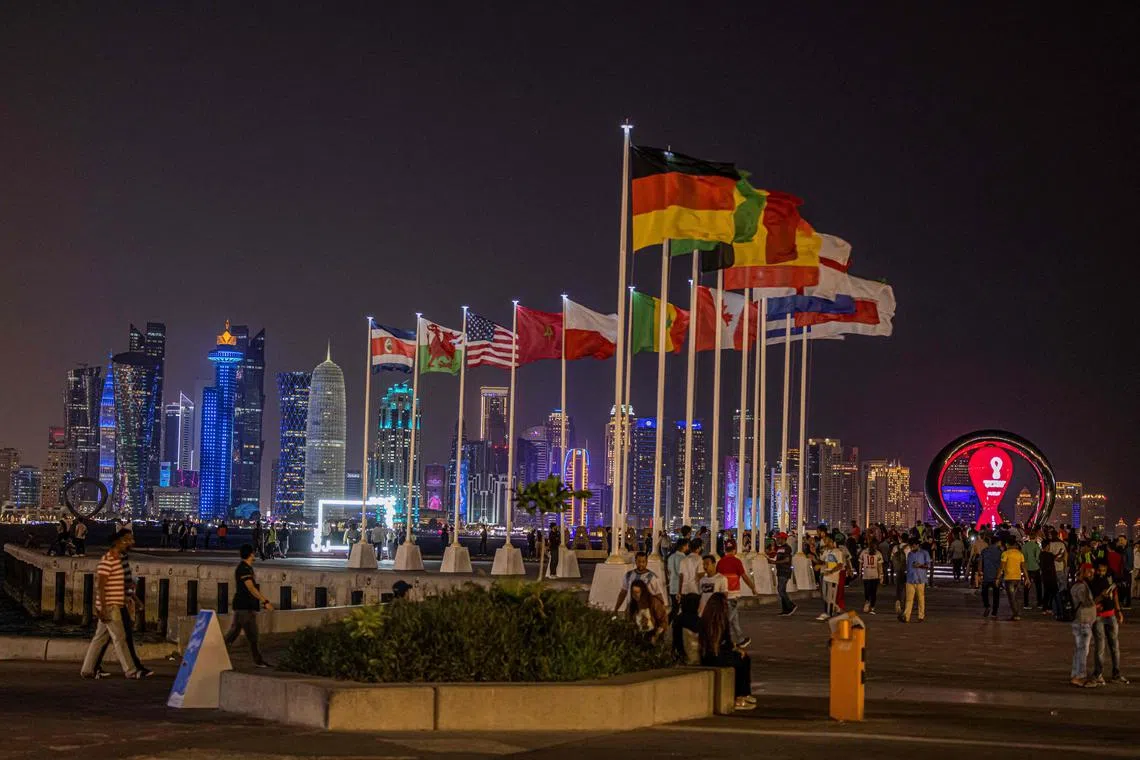World Cup: Qatar’s tarnished tournament is too big for brands to boycott
Sign up now: Get the biggest sports news in your inbox

Qatar 2022 is arguably the most scrutinised World Cup in history.
PHOTO: AFP
DOHA – There’s already never been a World Cup quite like Qatar 2022 before a ball has even been kicked.
Human rights groups are in uproar over everything from the treatment of LGBTQ people in a country
The organiser Fifa is recovering from corruption scandals that cast aspersions on how Qatar was awarded the competition to begin with. Erstwhile Fifa chief Sepp Blatter said he regretted that the Gulf country was picked as host.
But for all the hand-wringing over the quadrennial tournament, the World Cup could still attract five billion viewers – almost two-thirds of the planet’s population. And when there is an audience, brands will pay to reach them.
Bloomberg News contacted 76 companies sponsoring either the tournament or the teams taking part. They ranged from Adidas and Coca-Cola to Volkswagen and Microsoft’s XBox, and were based in places where human rights criticism was widespread – the United States, Canada and in Europe. All the seven Fifa sponsors said they would not make any changes to their global advertising plans to reflect concerns for human rights.
Of the 69 sponsors of national teams, 20 responded to express their commitment to human rights, though declined to disclose if or how their marketing might change. Thirteen companies did say they would make adjustments, though few have significant business ties to Qatar. They include Danish brewer Carlsberg, Belgian chocolatier Cote d’Or and accounting giant PwC’s Belgian unit.
This is arguably the most scrutinised World Cup in history, and executives are faced with a dilemma as pundits and politicians raise concerns over the host country. Yet financially, it’s a no-brainer: the potential to get hundreds of millions of eyeballs on a logo or marketing slogan during a troubled time for the global economy.
The tournament, which is starting in November for the first time to avoid the summer heat, is expected to deliver record revenue for Fifa, topping the roughly US$5.4 billion (S$7.4 billion) the 2018 Finals in Russia generated, Bloomberg reported last week.
“The public has become much more vocal about human rights than it was five or 10 years ago,” said Sarah Simon, a European media analyst at Berenberg Bank in London. “But it’s a one-in-four-year opportunity, so advertisers who advertise around the World Cup want to make the most of it.”
With audiences fleeing traditional broadcasters for online streaming services, sport remains one of the last bastions of live television viewing. The Olympics, Super Bowl and World Cup are some of the few occasions where brands can be counted upon to pay big bucks to reach a live audience, giving them outsized importance to TV advertising revenue.
The economic slump, meanwhile, has prompted brands to curb their marketing. They will spend an estimated US$90 billion less on advertising this year and next than previously expected, according to data company WARC.
That makes the World Cup, which began on Sunday, a timely bright spot – regardless of the controversy. The boost from the tournament is likely to offset the advertising market’s broader weakness.
UK commercial broadcaster ITV, for example, is predicted by analysts to record fourth-quarter sales on a similar level to a year before thanks to showing World Cup games. This comes as ad income at rivals is expected to dip.
“For all of the controversy around the World Cup, it couldn’t be coming at a better time for broadcasters,” said Matthew Bloxham, a media analyst for Bloomberg Intelligence. “Their advertising revenues are facing tough headwinds, and this will ease some of the pain.”
To say it’s a normal World Cup for advertisers and sponsors would be wrong, though. Many brands backing the Danish, Belgian and Dutch teams said they were not going to make use of ticket allocations for matches.
Carlsberg said it has halved its marketing budget compared with last year when Denmark played in the European Football Championship. It’s focused on supporting the team before it goes to Qatar, a spokeswoman said by e-mail. “Once the tournament starts, we have scaled back significantly compared to what we would normally do,” she said.
Cote d’Or said executives wouldn’t attend the World Cup or give tickets to customers, even though the brand is part of food distributor Mondelez International, whose products are readily found on Qatari grocery store shelves. PwC’s Belgian arm is doing likewise, while the company has a big presence in Qatar.
Indeed, companies will closely monitor the popular mood as the tournament unfolds towards the Dec 18 final. If the volume of criticism mounts, then some may think twice about continuing with campaigns that have been months in the planning, according to Martin Sorrell, the veteran British advertising executive who is now chairman of S4 Capital. BLOOMBERG


